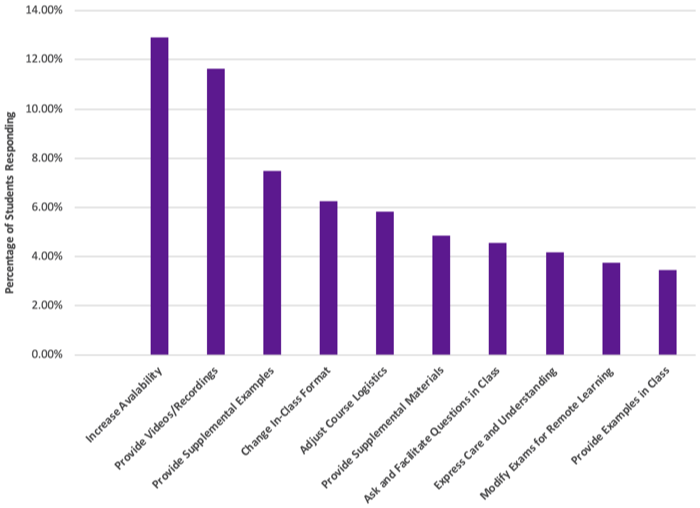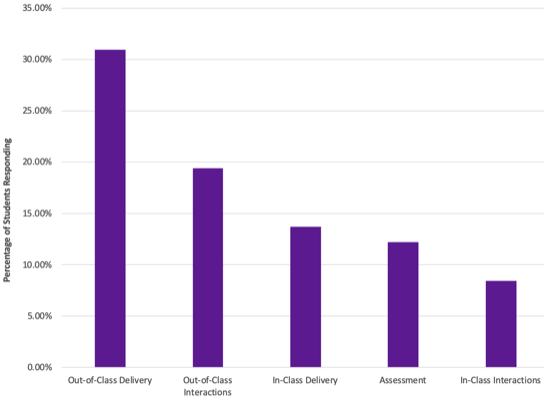
How can Faculty better support Students during Remote Learning?

When asked to identify one action that faculty could take to best support students during remote learning, the highest percentage of students (12.9%) responded with requests for faculty to increase their availability outside of class. Students had a wide range of ideas as to how faculty could increase the educational experience during remote learning which extended well beyond increased availability. Examples of these "best practices" as identified by students are described below.
Increase Availability outside of class (12.9% of responses)
"Having an abundance of office hours is very helpful. I think
"Being available to answer questions a little after lecture or during office hours." (undergraduate student, signals and systems course)
"I think they should offer more office hours or some added list of resources (TAs, websites, etc.) that we can use to get help. One of the hardest things about online classes is feeling like you don't have enough support, like friends in the class or tutoring centers, to be able to succeed." (undergraduate student, signals and systems course)
"Discussion sections with the
"Being extra accommodating & realizing how much more difficult it is to successfully complete a STEM course online is important. Having multiple office hours a week would definitely be a smart move *one of my other professors had 4 a week, an hour after every lecture which was so helpful). Students most likely will need extra help when we don't have any face time with classes, so being there to give extra help is necessary." (undergraduate, linear circuit theory course)
"Offer similar opportunities to in person classes as much as possible (ability to discuss with others, discuss with TAs, attend office hours, etc.)." (undergraduate student, dynamics course)
Provide video recordings of live class sessions or pre-recorded lectures (11.7% of responses)
"To best support students, Professor Chen's approach of interactive labs and recorded lectures proved most helpful…" (undergraduate student, introductory circuits course)
"Recording the lectures was extremely helpful. With the ability to revisit the lecture, I am able to re-enforce key concepts. In most cases, observing a lecture can be like drinking from a fire hydrant. Its difficult to think of questions until putting it in practice with homework." (undergraduate student, microelectronic circuits course)
"Offer live lectures, I find it much easier to learn when classes are live and recorded for students who cannot make live lectures." (undergraduate student, dynamics course)
"Do not offer pre-recorded lectures only. It is very easy for students to fall behind and it is almost impossible to catch up. It gives students a false hope that they will be able to go through the quarter very lazily and still do well, when this is not the case." (undergraduate student, digital circuits course)
Provide Supplemental Examples (7.5% of responses)
"Extra practice material is always the best. Extra optional homework problems. extra practice problems. Extra practice exams." (undergraduate student, linear circuit theory course)
"Some videos on real world examples would be good. For the most part it was pretty good the way it was presented." (undergraduate student, power systems course)
"Posting practice problems and old exams helps me get a better understanding of what to focus on when I'm studying." (undergraduate student, dynamics course)
Change In-Class Format (6.2% of responses)
In this category of responses, students often asked for virtual class sessions on Zoom to mirror the format of in-person classes as much as possible. Students appreciated having asynchronous access to recordings of live Zoom sessions as well as pre-recorded lectures, but favored structure in live class sessions that was similar to that used in in-person classes prior to the pandemic.
"Continue to teach the same as they did in class. I think some professors have this idea that because classes are online, they have to completely restructure their class. Most of the time, classes can just proceed as normal." (undergraduate student, signals and systems course)
"To support students in online classes, I really appreciate the style of teaching that is being used in
"Leave pauses in the lecture to allow for students to unmute and ask questions." (undergraduate student, linear circuit theory course)
Adjust Course Logistics (5.8% of responses)
In this category of responses, students struggled with finding all the information they needed at their fingertips and called for greater attention to organization and providing a one-stop-shop on learning management platforms (e.g. Canvas) to understand due dates and expectations for the course.
"Having well organized information on the class website. It's harder to pay attention on zoom, so having references on the site and things like saying what a zoom lecture link is about makes it easier to try to catch up. This class did a 10/10 job with this." (undergraduate student, signal processing course)
"Be highly organized. When we have a schedule that's well-mapped out and easy to reference, it makes planning school and life much easier. Everyone is talking about these "uncertain times"--if you have other responsibilities to take care of, a good course schedule and expectations will, I think, help students plan their lives in tandem with school and succeed." (undergraduate student, signals and systems course)
Provide Supplemental Materials (4.9% of responses)
"Provide written materials that contain the subject matter of the course. These may include lecture slides, scans of handouts, or reading assignments from a textbook." (undergraduate student, signal processing course)
"Due to online quarters, I felt it became more difficult to keep up with the learning, especially if there was confusion. So I think it would be helpful for professors to post a short weekly review video that covers all the important things we learned over that week, which should help clear up some confusion and give students a basis on what they should know at that point." (undergraduate student, signals and systems course)
Ask and Facilitate Questions in Class (4.6% of responses)
"Offering many opportunities to ask questions, like zoom sessions." (undergraduate student, dynamics course)
"Professors need to stay more on topic during lectures and spend less time answering every question students have, because its hard to actually learn anything if lectures are constantly interrupted by students." (undergraduate student, digital circuits course)
"Watch the participants and chat tabs in Zoom during lecture. Students are often too polite to interrupt the professor. In a physical classroom a raised hand allows the professor to finish their sentence before addressing the question. There isn't a good analogy in an online lecture, so it is easier to miss a question." (undergraduate student, power systems course)
Express Care and Understanding (4.2% of responses)
"Be more understanding of the student's situation and understand that some student have really difficult learning in a stressed environment. Showing signs not understanding puts student at a situation that makes them very difficult to focus on the material at hand eventually become more stressed to perform. It becomes a downward cascade that spirals to poor performance." (undergraduate student, linear circuit theory course)
"Taking the time to listen to the students." (undergraduate student, introductory circuits course)
"Be understanding! Realize that being at home can be even more stressful of an environment than at school so the amount of work that should be expected should not be more than normal." (undergraduate student, computer aided design course)
Modify Exams for Remote Learning (3.7% of responses)
"Restructure quizzes and stuff. In 235 we had a weekly quiz in lieu of midterms and a final, and that helped keep people engaged and paying attention." (undergraduate student, linear circuit theory course)
"Not providing traditional exams in online formats, or at least minimizing their effects on grades. It is extremely difficult for myself and many other students to concentrate and perform exams under these abnormal conditions, where the resources available to each student can vary and make the entire process very unbalanced." (undergraduate student, power systems course)
"Adjusting the grading scheme and course structure to best suit the online format (more frequent testing rather than large assessments, for example), would be helpful on the part of the professors." (undergraduate student, signals and systems course)
Provide Examples in Class (3.5% of responses)
"I think the only think that could help support me in my learning online is for them to provide more examples of the topic that we are currently on. This allows me to see how that topic is applied in different type of scenarios and prepare me on upcoming exams." (undergraduate student, dynamics course)
"Provide a lot of in class examples during lecture." (undergraduate student, dynamics course)
Which areas of Teaching do Students emphasize in their Responses?

Over 30% of student responses asked for changes in what faculty offered out-of-class with an emphasis on more supplemental materials, pre-recorded lectures, recordings of class sessions, and additional examples to supplement live class sessions. Students also emphasized out-of-class interactions in their responses with almost 20% asking for faculty to be more available and more responsive to accommodate their needs during remote learning.

